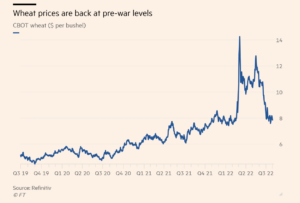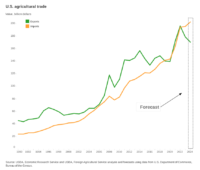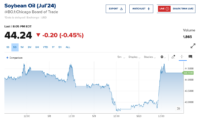Bloomberg's Clarice Couto reported this past Friday that "a surprising tax change in agriculture powerhouse Brazil has the potential to make soy grown in the world’s largest bean exporter less…
“Months” Before Ukraine Grain Exports Reach Prewar Levels and Backlog of Grain in Storage Cleared
Financial Times writers Mehul Srivastava, Laura Pitel, Harry Dempsey and Emiko Terazono reported yesterday that, “Ukraine’s infrastructure minister has warned it will take months before grain exports from Odesa and neighbouring ports reach prewar levels and alleviate the global food crisis despite the relaxation of a Russian blockade in the Black Sea.
“Speaking after the departure on Monday of a ship transporting corn from Odesa to Lebanon — the first under a deal between Russia and Ukraine brokered by the UN last month — Oleksander Kubrakov said he expected no more than five vessels to leave in the next two weeks from Odesa, Chornomorsk and Pivdennyi.
“Last August, 194 grain-carrying vessels departed Ukrainian ports, including now Russia-controlled Mariupol, according to London-based shipbroker Braemar. Odesa, Chornomorsk and Pivdennyi previously handled about 60 per cent of all Ukrainian grain exports.”
The FT writers explained that, “Moving the 20mn-25mn tonnes of grain trapped in Ukraine will take at least 371 loadings of medium-sized vessels that can carry 40,000-69,000 deadweight tonnes — or nearly twice as many of the smaller ‘Handysize’ vessels such as the Razoni, which set sail on Monday, according to Braemar.”
Yesterday’s article added that, “[T]he prospect of a reopening of the Black Sea corridor, along with global recession fears and record crops in Russia, have recently pushed down agricultural commodity prices.”

Jared Malsin and Alistair MacDonald reported in today’s Wall Street Journal that, “Officials in Ukraine are racing to clear a backlog of millions of metric tons of grain trapped by Russia’s invasion after the first shipment left the country this week, a task they warn could take months in an effort to boost wartime exports and ease the global food crisis.”
The Ukrainian government said it believes it could take months to clear the buildup of grain and seed in storage facilities. Convincing cargo companies to return to the war-torn country to maintain the flow of exports—and finding insurance for those willing to do so—could also be tricky, Ukrainian officials say.
Malsin and MacDonald pointed out that, “The challenge now, officials say, is to make sure the ship reaches its destination smoothly, and then accelerate operations to export an estimated 16 million metric tons of grain trapped in Ukraine since war broke out. But silos and barns are fast filling up with this season’s wheat and barley harvests, raising fears that storage space will run out.
“Around 4 million metric tons of barley and 9 million metric tons of wheat have been harvested so far this summer, according to Ukraine’s Ministry of Agrarian Policy and Food.
“Ukraine expects no more than five vessels to leave its ports in the next two weeks, meaning it could take months to free up space, according to the country’s deputy minister of infrastructure, Mustafa Nayyem.”
Bloomberg News reported yesterday that, “The first ship carrying grain from Ukraine under an agreement with Russia arrived in Turkey. The Kremlin said that Russian President Vladimir Putin will meet Turkish leader Recep Tayyip Erdogan for talks in the Black Sea resort of Sochi on Friday, including on the deal brokered by Turkey and the United Nations to unblock Ukraine’s grain exports.”
And Reuters writers Umit Bektas and Bulent Usta reported today that, “A team of inspectors boarded the first grain-carrying ship to leave Ukrainian ports in wartime on Wednesday before it continues to its final destination in Lebanon under a U.N.-brokered deal that aims to ease a global food crisis.”
The Reuters article noted that, “A senior Turkish official told Reuters on Tuesday that Ankara expects roughly one ship to leave three Ukrainian ports in the Black Sea daily.”
Also today, Reuters writer Carolyn Cohn reported that, “Hiscox is committed to a planned insurance consortium providing cover for ships travelling through a safe passage from Ukraine, its chief executive said on Wednesday, as the Lloyd’s of London insurer shares plunged on a first-half loss.”
And in news regarding agricultural production, Bloomberg writers Pratik Parija and Vrishti Beniwal reported today that, “Rice could emerge as the next challenge for global food supply as a shortage of rain in parts of India, by far the world’s biggest exporter, has caused planting area to shrink to the smallest in about three years.

“The threat to India’s rice production comes at a time when countries are grappling with soaring food costs and rampant inflation. Total rice planted area has declined 13% so far this season due to a lack of rainfall in some areas, including West Bengal and Uttar Pradesh, which account for a quarter of India’s output.”
Yesterday, Bloomberg writer Vivian Iroanya reported that, “France experienced its driest July on record as searing heat spread across Europe, putting strain in key crops.”
“The scorching temperatures and dryness have led to forest fires on France’s west coast and hit the nation’s farmers, hampering the key flowering period for corn fields. The share of the country’s corn crop in good or very good condition fell to 68% as of July 25 from 75% a week earlier, FranceAgriMer said on Friday.”
And today, Reuters News reported that, “Romania’s wheat harvest is large enough to cover its domestic needs and ensure a surplus for exports, Agriculture Minister Petre Daea said on Wednesday, with 96% of the crop reaped so far.”







